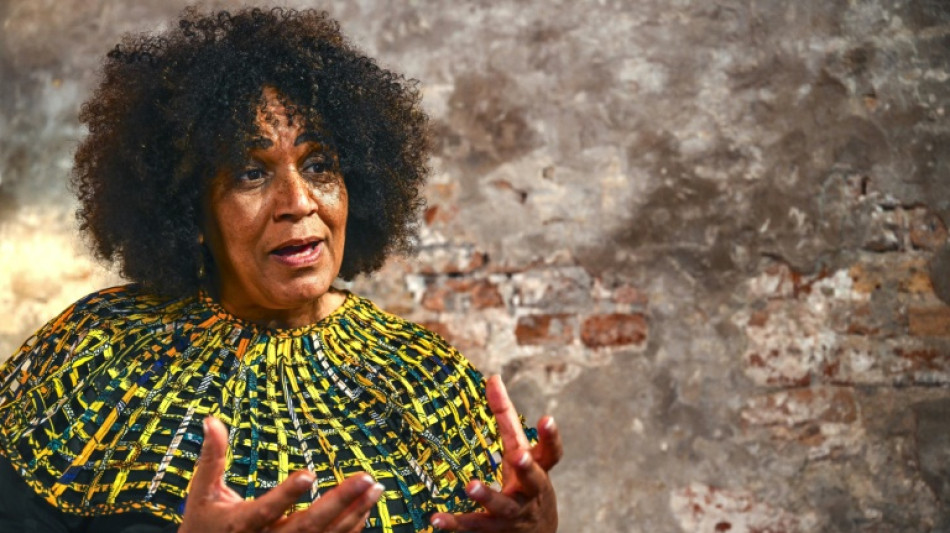
-
 Gold hits record, dollar drops as tariff fears dampen sentiment
Gold hits record, dollar drops as tariff fears dampen sentiment
-
As Dalai Lama approaches 90, Tibetans weigh future
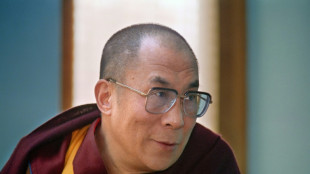
-
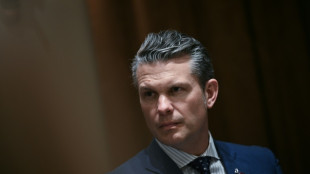 US defense chief shared sensitive information in second Signal chat: US media
US defense chief shared sensitive information in second Signal chat: US media
-
Swede Lingblad gets first win in just third LPGA start

-
 South Korea ex-president back in court for criminal trial
South Korea ex-president back in court for criminal trial
-
Thunder crush Grizzlies, Celtics and Cavs open NBA playoffs with wins

-
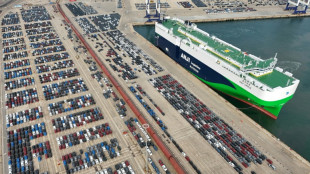 Beijing slams 'appeasement' of US in trade deals that hurt China
Beijing slams 'appeasement' of US in trade deals that hurt China
-
Trump in his own words: 100 days of quotes

-
 Padres say slugger Arraez 'stable' after scary collision
Padres say slugger Arraez 'stable' after scary collision
-
Trump tariffs stunt US toy imports as sellers play for time

-
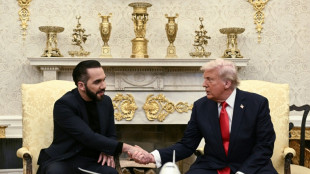 El Salvador offers to swap US deportees with Venezuela
El Salvador offers to swap US deportees with Venezuela
-
Higgo holds on for win after Dahmen's late collapse

-
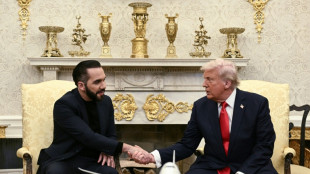 El Salvador's president proposes prisoner exchange with Venezuela
El Salvador's president proposes prisoner exchange with Venezuela
-
Gilgeous-Alexander, Jokic, Antetokounmpo named NBA MVP finalists

-
 Thomas ends long wait with playoff win over Novak
Thomas ends long wait with playoff win over Novak
-
Thunder rumble to record win over Grizzlies, Celtics top Magic in NBA playoff openers

-
 Linesman hit by projectile as Saint-Etienne edge toward safety
Linesman hit by projectile as Saint-Etienne edge toward safety
-
Mallia guides Toulouse to Top 14 win over Stade Francais

-
 Israel cancels visas for French lawmakers
Israel cancels visas for French lawmakers
-
Russia and Ukraine trade blame over Easter truce, as Trump predicts 'deal'

-
 Valverde stunner saves Real Madrid title hopes against Bilbao
Valverde stunner saves Real Madrid title hopes against Bilbao
-
Ligue 1 derby interrupted after assistant referee hit by projectile

-
 Leclerc bags Ferrari first podium of the year
Leclerc bags Ferrari first podium of the year
-
Afro-Brazilian carnival celebrates cultural kinship in Lagos

-
 Ligue 1 derby halted after assistant referee hit by projectile
Ligue 1 derby halted after assistant referee hit by projectile
-
Thunder rumble with record win over Memphis in playoff opener

-
 Leverkusen held at Pauli to put Bayern on cusp of title
Leverkusen held at Pauli to put Bayern on cusp of title
-
Israel says Gaza medics' killing a 'mistake,' to dismiss commander

-
 Piastri power rules in Saudi as Max pays the penalty
Piastri power rules in Saudi as Max pays the penalty
-
Leaders Inter level with Napoli after falling to late Orsolini stunner at Bologna

-
 David rediscovers teeth as Chevalier loses some in nervy Lille win
David rediscovers teeth as Chevalier loses some in nervy Lille win
-
Piastri wins Saudi Arabian Grand Prix, Verstappen second

-
 Kohli, Rohit star as Bengaluru and Mumbai win in IPL
Kohli, Rohit star as Bengaluru and Mumbai win in IPL
-
Guirassy helps Dortmund past Gladbach, putting top-four in sight

-
 Alexander-Arnold lauds 'special' Liverpool moments
Alexander-Arnold lauds 'special' Liverpool moments
-
Pina strikes twice as Barca rout Chelsea in Champions League semi

-
 Rohit, Suryakumar on song as Mumbai hammer Chennai in IPL
Rohit, Suryakumar on song as Mumbai hammer Chennai in IPL
-
Dortmund beat Gladbach to keep top-four hopes alive

-
 Leicester relegated from the Premier League as Liverpool close in on title
Leicester relegated from the Premier League as Liverpool close in on title
-
Alexander-Arnold fires Liverpool to brink of title, Leicester relegated

-
 Maresca leaves celebrations to players after Chelsea sink Fulham
Maresca leaves celebrations to players after Chelsea sink Fulham
-
Trump eyes gutting US diplomacy in Africa, cutting soft power: draft plan

-
 Turkey bans elective C-sections at private medical centres
Turkey bans elective C-sections at private medical centres
-
Lebanon army says 3 troops killed in munitions blast in south

-
 N.America moviegoers embrace 'Sinners' on Easter weekend
N.America moviegoers embrace 'Sinners' on Easter weekend
-
Man Utd 'lack a lot' admits Amorim after Wolves loss

-
 Arteta hopes Arsenal star Saka will be fit to face PSG
Arteta hopes Arsenal star Saka will be fit to face PSG
-
Ukrainian troops celebrate Easter as blasts punctuate Putin's truce

-
 Rune defeats Alcaraz to win Barcelona Open
Rune defeats Alcaraz to win Barcelona Open
-
Outsider Skjelmose in Amstel Gold heist ahead of Pogacar and Evenepoel


Venice exhibition shines light on Africa's forced urbanisation
From nomads to deforestation, this year's Venice Architecture Biennale focuses on Africa and the impact of colonisation on the development of a continent undergoing the most rapid urbanisation in the world.
Away from the national pavilions, the main exhibition put together by Biennale curator Lesley Lokko shines a light on the enduring impact of the colonising Europeans who upended traditional ways of life.
Mounir Ayoub, a 40-year-old Tunisian architect based in Geneva, has long been interested in the phenomenon in Tunisia of forced settlement.
Before being colonised by France in 1881, the North African country of his birth "was mostly a country with a nomadic population -- 600,000 nomads and 400,000 sedentary (settled) people", he told AFP.
But through his collection of photos, documents and video testimony from the few remaining nomad families, he argues that France initiated a policy that eventually left the Tunisian desert depopulated.
"The desert was not empty, it was a rich ecosystem with a huge culture. The desert was populated, it was a place of immense civilisation," he told AFP at the exhibition at Venice's former shipyards.
But "France created new cities with oases where water was extracted deep in the desert in order to settle the nomads, to control them, in fact, to start setting up borders", said Ayoub.
The policy continued even after Tunisian independence in 1956, he said, with Tunisian nomads definitively settled by the 1970s and 1980s.
Pointing to places on a map that he said once teemed with life, he lamented that "now there is almost nothing left... even though the whole of Arab civilisation comes from the desert and nomadism".
The end of nomadism was a cultural loss but also an environmental one, as the travelling families had "a minimal impact on the environment", said Ayoub.
The exhibit includes a nomadic tent -- "organic architecture in the first sense of the word: goats, sheep and camels provide hair that is woven into tents".
- No return to 'pure state' -
The number of cities in Africa has doubled since 1990, with their combined population increasing by 500 million people, according to the African Development Bank.
But urban and economic growth has been not only at the expense of Africa's vast deserts but also the continent's forests.
Sammy Baloji, a photographic artist from Lubumbashi, a city in the south of the Democratic Republic of Congo, charted the depletion of his country's rainforests in his project for the exhibition.
He says the process began with Belgium's rule over his country, as part of a colony also including Rwanda and Burundi, when traditional methods of cultivation were abandoned in favour of intensive agriculture.
Baloji said his project, "Debris of History, Issues of Memory", examines "all this human activity from which global warming stems, through the colonisation and devastation of this original vegetation".
The basin of the Congo River is a huge rainforest, second in size only to the Amazon, that absorbs more carbon than it releases -- an environmental benefit threatened by deforestation.
"The question is not to return Africa to its pure state," said Baloji.
"What is interesting is to observe what has been done so far: has it been done taking into account the local populations, their knowledge? Or has it been a devastation of that system to impose another system?"
- Past trauma, future visions -
The exhibition is the brainchild of Lokko, a Ghanaian-Scottish architect who curated this year's Biennale.
She invited 89 participants to contribute to "The Laboratory of the Future", with more than half of them from Africa or the African diaspora.
"We're looking at the more painful aspects of the past, and using that trauma and that vulnerability around questions of identity, migration... which are generally questions architects don't deal with, to inform new visons of the future," Lokko told AFP.
"Our relationship to the environment is a cultural relationship, it's not only a scientific or transactional relationship."
The job of every architect, she said, is "to look at the past in order to project an idea about the future".
J.Fankhauser--BTB




